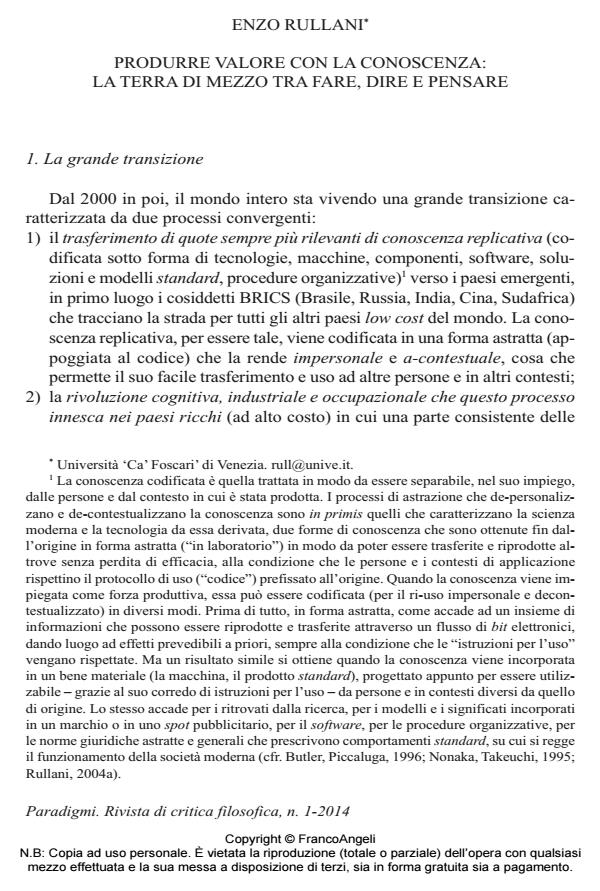How to Produce Value Through Knowledge: the Middle Ground Between Making, Saying and Thinking
Journal title PARADIGMI
Author/s Enzo Rullani
Publishing Year 2014 Issue 2014/1 Language Italian
Pages 25 P. 111-135 File size 546 KB
DOI 10.3280/PARA2014-001007
DOI is like a bar code for intellectual property: to have more infomation
click here
Below, you can see the article first page
If you want to buy this article in PDF format, you can do it, following the instructions to buy download credits

FrancoAngeli is member of Publishers International Linking Association, Inc (PILA), a not-for-profit association which run the CrossRef service enabling links to and from online scholarly content.
The role of knowledge in productive and social life is changing dramatically. Indeed, a global market enables codified knowledge to be reproduced, transferred and mechanized at no cost, in real time. This possibility brings into play the low cost production of many emerging countries, blowing up the previous equilibrium of power. The countries of developed capitalism have major chances in this process, if they invest resources in creating a relevant basis of generative knowledge. It’s a serious challenge not only for businesses but also for workers and territories, who must learn to put together the abilities of making, saying and thinking.
Keywords: Codified knowledge, globalization, mechanization, generative knowledge, labor, territory
- Becattini G. (2000). Il distretto industriale. Un nuovo modo di interpretare il cambiamento economico. Torino: Rosenberg e Sellier.
- Bologna S. (2007). Ceti medi senza futuro? Roma: Derive Approdi.
- Bonomi A. (2000). Il distretto del piacere. Torino: Bollati Boringhieri.
- Bonomi A. e Rullani E. (2005). Il capitalismo personale. Vite al lavoro. Torino: Einaudi.
- Brynjolfsson E. e McAfee A. (2011). Race Against The Machine: How the Digital Revolution is Accelerating Innovation, Driving Productivity, and Irreversibly Transforming Employment and the Economy. Lexington (MA): Digital Frontier Press.
- Butler J. e Piccaluga A., a cura di (1996). Knowledge, Technology and Innovative Organizations. Milano: Guerini e Associati.
- Cowen T. (2013). Average Is Over: Powering America Beyond the Age of the Great Stagnation. New York: Dutton Penguin Group.
- CSC (Centro Studi Confindustria) (2012). Scenari Industriali, 3 (giugno).
- Di Bernardo B. e Rullani E. (1990). Il management e le macchine. Teoria evolutiva dell’impresa. Bologna: Il Mulino. Gaggi M. e Narduzzi E. (2006). La fine del ceto medio e la nascita della società low cost. Torino: Einaudi.
- Galbraith J.K. (1967). The New Industrial State. Boston (Mass.): Houghton Mifflin (trad. it.: Il nuovo stato industriale. Torino: Einaudi, 1968).
- Grazzini E. (2008). L’economia della conoscenza oltre il capitalismo. Torino: Codice edizioni.
- Micelli S. (2011). Futuro artigiano. L’innovazione nelle mani degli italiani. Venezia: Marsilio.
- Moretti E. (2012). New Geography of Jobs. Boston (Mass.): Houghton Mifflin (trad. it.: La nuova geografia del lavoro. Milano: Mondadori, 2013).
- Nonaka I. e Takeuchi H. (1995). The Knowledge Creating Company. How Japanese Companies Create the Dynamics of Innovation. New York: Free Press (trad. it.: The Knowledge-creating company. Creare le dinamiche dell’innovazione. Milano: Guerini, 1997).
- Rullani E. (2004a). Economia della conoscenza. Creatività e valore nel capitalismo delle reti. Roma: Carocci.
- Rullani E. (2004b). La fabbrica dell’immateriale. Produrre valore con la conoscenza. Roma: Carocci.
- Rullani E. (2006). Dove va il Nordest. Vita, morte e miracoli di un modello. Venezia: Marsilio.
- Rullani E. (2010a). ICT e impresa diffusa: per superare l’anello mancante. In: Centro Studi Confindustria, a cura di. Scenari Economici (dicembre): 133-168.
- Rullani E. (2010b). Impresa e produzione di valore nell’era della complessità. Sinergie , 81 (gennaio-aprile): 225-242.
- Rullani E. (2010c). Modernità sostenibile. Idee, filiere e servizi per uscire dalla crisi. Venezia: Marsilio.
- Rullani E. (2011). Lavoro immateriale e società della conoscenza. In: Gosetti G., a cura di. Il lavoro: condizioni, problemi, sfide. Milano: Franco Angeli: 13-34.
- Rullani E. (2012a). Produttività cercasi, disperatamente: per un nuovo rapporto tra manifattura e servizi. Economia e Società Regionale, 3: 24-54.
- Rullani E. (2012b). Produttività e servizi: una storia di divergenze parallele. In: Rullani E. et al., a cura di. Innovazione e produttività. Alla ricerca di nuovi modelli di business per le imprese di servizi. Milano: Franco Angeli: 35-96.
- Smith N. (2013). The end of labor: how to protect workers from the rise of robots. The Atlantic, 14 gennaio 2013.
Enzo Rullani, Produrre valore con la conoscenza: la terra di mezzo tra fare, dire e pensare in "PARADIGMI" 1/2014, pp 111-135, DOI: 10.3280/PARA2014-001007